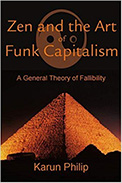
 |
A spirited treatise on the philosophy of economics, Philip’s text examines such interwoven issues of poverty, capitalism, fallibility, human knowledge, education, societal welfare, entrepreneurship, and more. After an initial chapter covering general epistemology (philosophy of knowledge), the author addresses the core issue of poverty as an unfortunate consequence of capitalism, even though it is the modern Western capitalistic system, he asserts, which has benefited the greatest number of people. “There is no doubt that poverty is undesirable,” Philip writes, “and disturbing to anyone who has ordinary human emotions.” However, he argues, no government can—or should—attempt to “legislate a ban on poverty.” Rather, the author stresses, democratic debate and scientific inquiry are invaluable vehicles for understanding oppression and monetary challenge. Philip draws much of his ideas from Austrian economist Friedrich Hayek (1899–1992).
An interesting appendix takes a look at the world’s major religions of Hinduism, Buddhism, Judaism, Christianity, and Islam, positing that the growing number of people who are non-religious (self-described “rationalists”) would do well to consider that these religious traditions have in common the sincere intention to value (at least in theory) all human life, seeking an existence for their respective cultures which aims to fulfill the needs—including basic sustenance—of all members in society. Philip ultimately attempts to make a case for a kinder, gentler capitalism with reasonable regulations built-in and safety-nets present to safeguard those monetarily and socially marginalized. Readers interested in such matters and who wish to consider the possibilities surrounding an examination of competing economic philosophies will absolutely enjoy Philip’s book. It reads rather like an academic and informed long-form essay on the “funk” (or underbelly) of capitalism and is quite an intellectually stimulating read.